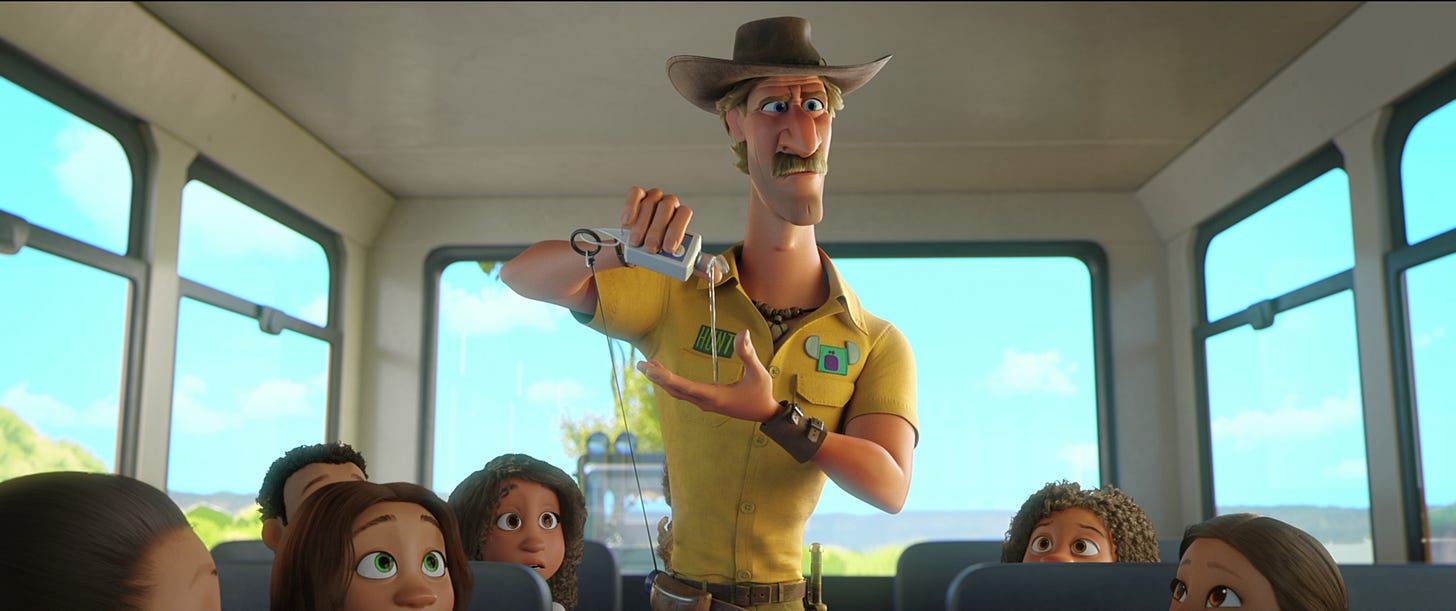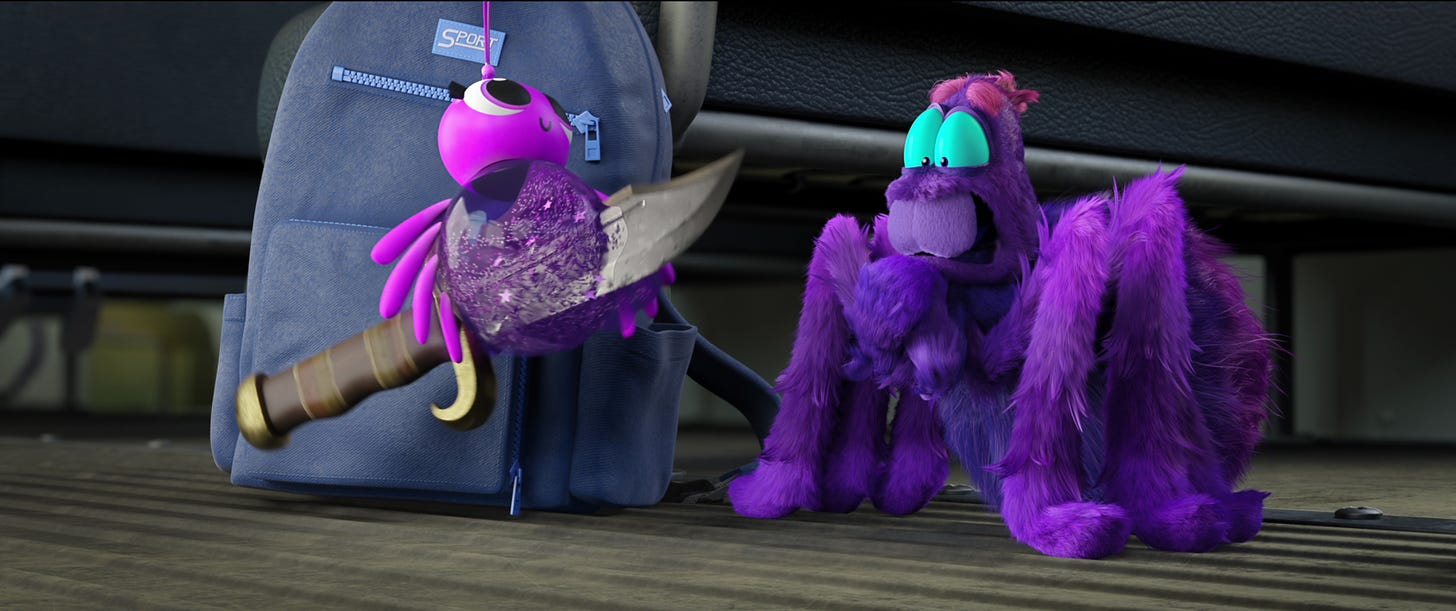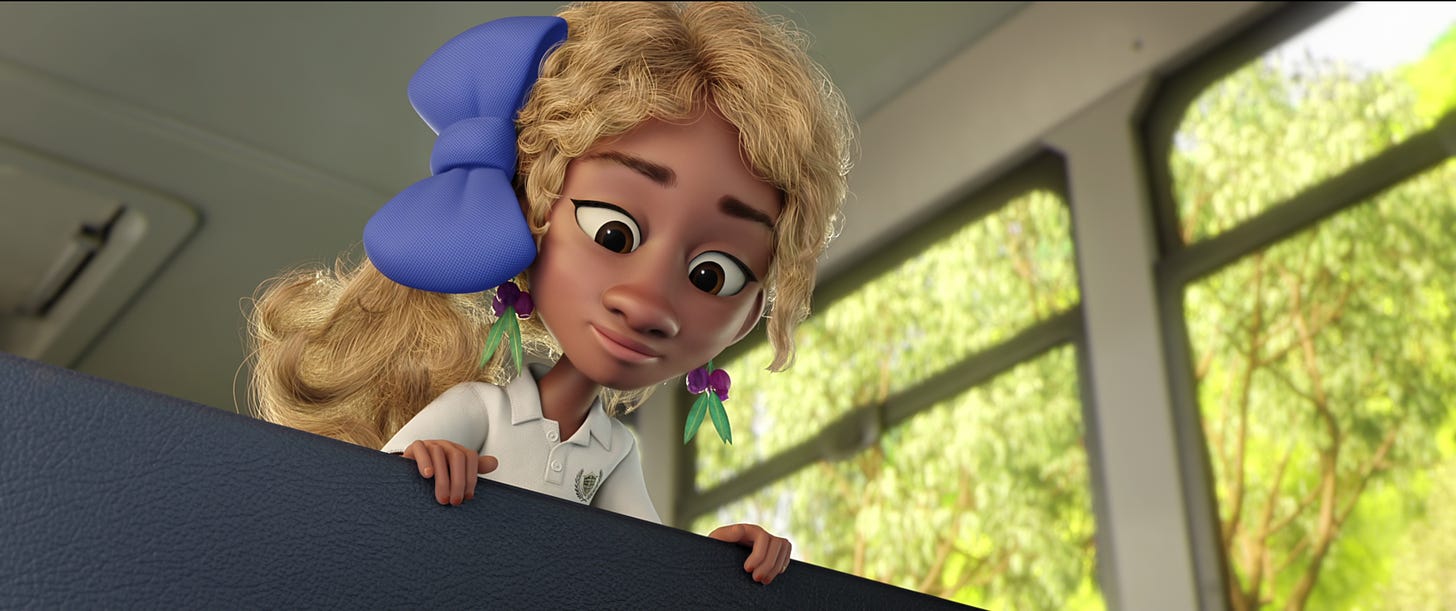Back to the Outback imparts a childlike wisdom
Clementine Ford on the lessons her son has taught her
You’re reading Scene & Heard, a weekly newsletter where I chat to a guest writer about the one scene from a recent Netflix release that left them floored. It’s part of Netflix Pause, a publication that’s all about hitting pause to reflect on the latest film and TV. Subscribe now to get it in your inbox every week diving into screen culture.
I’m Joseph Lew, editor of Netflix Pause, and I don’t think there’s a harder job than being a parent. It’s something my parents might finally agree with me on – after all, they popped out a son with a Sims addiction and a tendency to sing *very loudly and very badly* in the shower.
For the last Scene and Heard of the year, I reached out to writer, broadcaster and proud parent Clementine Ford. Reflecting on a moment from animated film Back to the Outback where a group of escaped animals are rescued by a young schoolgirl, Clementine opens up about the lessons that she wants to impart on her son, but also the ones that he’s imparted on her.

JL: For myself growing up, animated films shaped my worldview – Kung Fu Panda, Shrek, Mulan, all taught me valuable life lessons. It’s the same that might be said for Back to the Outback, which although lighthearted, carries a lot of lessons along the way, such as in this scene here…
CF: In this scene I’ve chosen, there’s this motley collection of five animals who have just escaped from a fictionalised version of Taronga Zoo and are trying to make their way back home to the Outback. They're on the run from this Steve Irwin-wannabe zookeeper character who’s trying to catch them and bring them back ,and they find themselves in a school bus taking them up to the Blue Mountains.
And in the bus, all the kids see these animals, and they’re all scared of them. But there’s one little girl at the back of the bus, Norine, who sees them and is not afraid of them – she steals them away into her backpack to rescue them from being captured.
It was so obvious that there was a comment being made there about connection to land in the fact that the girl is Indigenous. My son's five, and we talk a lot about – to the degree that he can understand – the history of colonisation. Telling a story in a way like this makes it very understandable for little minds to wrap their head around. And it’s a way for us to actually have those conversations with kids.
Speaking of important conversations, you've written novels that broach topical issues like, Fight Like A Girl and Boys Will Be Boys? It’s a whopping question to start off with, but what are some of the lessons you want to impart on him as a parent?
The first and foremost thing that I am very conscious of with him is kindness and compassion. I want him to understand his place in the world, and as he gets older, to understand the privileges that he has, and to use those to make change within those spaces.
There’s this old feminist saying – it's sort of one of those things that's gone around the internet, and no one knows who originally said it – but it's basically like, ‘it's not up to feminism to make space for men, it's up to men to take the space that they have in society and make it feminist.’ And I think that it's probably a little bit simplistic to use in a modern era where we understand the complexities of intersectionality, but the premise still stands – I want him to use his privilege to make the spaces he occupies inclusive.
I also want to have conversations with him as he gets older about our choices and the impact that our choices have. And to say to him, ‘as you get older, and you have more autonomy, there are going to be choices that you make that you're going to want to keep from me, and that's fine. That's a normal part of growing up. But I want you to think, with every choice that you make, will this make mum mad, or would this make her think of me differently? Because I can deal with being mad at you – if I found out you were smoking cigarettes, I'd be mad, but also I smoked cigarettes when I was a teenager. But if I found out that you've been bullying someone, or that you'd shared photographs without someone's permission, or that you'd harassed someone, or were being racist, or homophobic, or anything that so starkly contradicts the values that I've raised you in, I would think of you differently. You have to ask yourself before any choice that you make, can you live with the consequences of that?’
But I mean, I'm a mother of a five-year-old, and I've never done this before. I'm just figuring it out as I go along. It's a scary prospect, but I appreciate films like this, which provide really accessible opportunities to have conversations about the kind of person that I want him to be.
I feel like parents always speak on the lessons they want to teach, but has it ever been the other way around? Personally, watching Norine’s character, I definitely had a moment of introspection where I was like ‘how did I become so jaded?’ Is there anything you’ve learnt from your son about what it means to be an adult or even just a better person?
Absolutely! I learn from my son all the time. I know it sounds like a cliche and previously, before I had a child, I might have rolled my eyes if I heard someone say this, but I really get it now. He’s one of my biggest teachers. The way that children look at the world is really pure, and untainted by a lot of the shit that we pick up along the years.
I remember this one incident where we'd been at a play centre with him and one of his friends, and he pushed her. And they were young and sometimes when kids get overwhelmed, they physically react. But it's not acceptable behaviour. And I'm never going to be the person that's like, ‘oh, he's just being a kid, or he's just being a boy’, like, it wasn't acceptable.
And I went to him – he was crying in the corner, because he obviously felt bad about what he’d done – to have a stern conversation. And he was crying, and I was mad. And my impulse, because of the way that I was parented, was to tell him off and then leave him to sit with that feeling. I was almost about to do it, but there was something that felt not right. I was thinking: ‘Don't walk away from him. He's just a little kid and he's upset, that's not going to teach him the lesson that you want him to learn.’
So, I lay next to him, and I held him, and he cried even more. He knew that he had done the wrong thing, but I think he also felt safe that I wasn't going to punish him for it or hate him for it. And I said to him, ‘You need to go and apologise to Olivia’. And he said, ‘I don't want to’. And I said, ‘Is that because it's scary?’ And he said, ‘Yes’. And I said, ‘Yeah, I feel the same way too. Whenever I have to apologise, I feel scared to but it's right to apologise’. And he said, ‘It feels like going into a big, haunted house’.
And when he said it, I was like, ‘That's exactly it; it does feel like going into a big scary house – you don't know what's waiting for you in there’. Apologising to people is one of the best lessons that we can learn, and to do it well is something that still so many people don't know how to do. But I felt like by having that conversation, I could teach him something about it early on, and in doing so, learn something about it myself as well. The only thing that stops people from apologising most of the time is that we're just afraid.
That’s such a great example, and also such a testament to how we often misunderstand children.
He is just a genuinely very kind person, but I worry so much about the pressures of patriarchy and masculinity in school and how that might take something away from him. I’ve been thinking a lot about bell hooks and her terribly sad passing this week, and the things that she's written about masculinity and manhood – how the first act of violence that patriarchy demands of men is not violence towards other people, but violence towards themselves by teaching them to excise the parts of themselves that are soft. And I worry about that a lot with him. How do I protect him from a world that wants to hand him a knife and tell him to cut out the parts of himself that don't fit?
Clementine Ford is a writer and broadcaster living on Wurundjeri country in Naarm/Melbourne. She is the author of three books: Fight Like A Girl, Boys Will Be Boys and How We Love. You can follow her on Twitter and Instagram.





